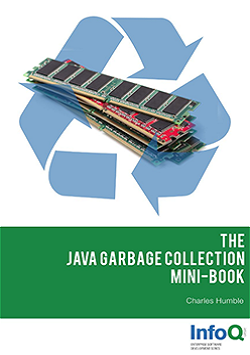
|
FreeComputerBooks.com
Links to Free Computer, Mathematics, Technical Books all over the World
|
|
- Title The Java Garbage Collection Mini-Book
- Author(s) Charles Humble, Ben Evans, Alex Blewitt, Siben Nayak
- Publisher: InfoQ (2015); FreeCodeCamp (2021)
- Paperback: N/A
- ebook HTML
- Language: English
- ISBN-10: N/A
- ISBN-13: N/A
- Share This:

|
The Java Garbage Collection Mini-book provides a concise, accessible guide for Java architects and senior developers who want to understand what garbage collection is, how it works, and how it impacts the execution of their programs.
This book dives right into the details. Starting with an examination of the Java heap and pointers, safe-points, and generational collection, the book then explores each collector in turn, describing its memory structure, the basics of the algorithm, and its performance characteristics.
The collectors covered are:
- Serial, Parallel, CMS and G1 from the OpenJDK distributions
- Balanced and Metronome from IBM
- C4 from Azul Systems
- Red Hat's forthcoming Shenandoah
Later sections look at tuning, logging, and some programming techniques to produce less garbage.
About the Authors- Ben Evans is Principal Engineer & Architect for JVM Technologies at New Relic. Previously, he co-founded jClarity, a JVM performance optimization company (acquired by Microsoft in 2019).
- Siben Nayak: Software Engineer at Intuit, ex-Amazon, Intel • Cloud Architect • Innovator and Builder • Blogger • Speaker • Love Coding and Building Distributed Systems

- The Java Garbage Collection Mini-Book (Charles Humble)
- The Mirror Site (1) - PDF
- The Mirror Site (2) - PDF
- The Mirror Site (3) - PDF
- Garbage Collection in Java – What is GC and How it Works in the JVM (Siben Nayak)
-
 Dynamic Proxies in Java (Heinz M. Kabutz)
Dynamic Proxies in Java (Heinz M. Kabutz)
Dynamic proxies are such a tool that we can use it to save thousands of lines of repetitive code with a single class. This book is for intermediate to advanced Java programmers who want to get to "guru" status. It is not suitable for beginners in Java.
-
 Naked Objects (Richard Pawson, et al)
Naked Objects (Richard Pawson, et al)
The aim of this book is to introduce you to the concept of designing business systems from naked objects, and to enable you to start building such systems using the Naked Objects framework. It outlines a lightweight methodology and provides a short tutorial.
-
 Object-Oriented vs. Functional Programming (R. Warburton)
Object-Oriented vs. Functional Programming (R. Warburton)
This book discusses similarities between these programming paradigms and points out that both FP and OOP are actually moving closer toward one another. One prominent example is the use of lambda expressions in Java and other OOP languages.
-
 The Java Web Scraping Handbook (Kevin Sahin)
The Java Web Scraping Handbook (Kevin Sahin)
This book will teach you how to extract data from any website, how to deal with AJAX / Javascript heavy websites, break captchas, deploy your scrapers in the cloud and many other advanced techniques, using Java programming language.
-
 What Every Programmer Should Know About Memory
What Every Programmer Should Know About Memory
This document explains the structure of memory subsystems in use on modern commodity hardware, illustrating why CPU caches were developed, how they work, and what programs should do to achieve optimal performance by utilizing them.
-
 Pointers and Memory (Nick Parlante, et al.)
Pointers and Memory (Nick Parlante, et al.)
This is an introduction to programming with pointers and memory in C, C++ and other languages. Explains how pointers and memory work and how to use them -- from the basic concepts through all the major programming techniques.
-
 Programming Persistent Memory: A Comprehensive Guide
Programming Persistent Memory: A Comprehensive Guide
The book explains fundamental concepts, provides an introduction to Persistent Memory programming APIs for C, C++, JavaScript, and other languages, discusses RMDA with persistent memory; reviews security features; and presents many examples.





